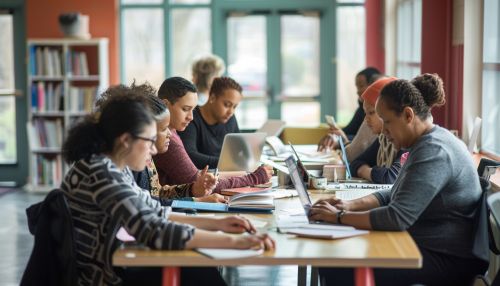Self-directed learning
Definition and Overview
Self-directed learning (SDL) is a process where individuals take the initiative, with or without the assistance of others, in diagnosing their learning needs, formulating learning goals, identifying human and material resources for learning, choosing and implementing appropriate learning strategies, and evaluating learning outcomes. This approach to learning emphasizes autonomy and independence, fostering skills that extend beyond the academic realm and into the workplace and personal life.
Historical Context
The concept of self-directed learning has roots in the philosophy of adult education, which emerged in the early 20th century. The term itself was popularized in the 1970s by education researchers such as Malcolm Knowles, who is often considered the "father" of adult learning. Knowles identified self-directed learning as one of the key assumptions of adult learning, differentiating it from pedagogical models of learning typically used in the education of children.
Theoretical Frameworks
Several theoretical frameworks underpin the concept of self-directed learning. These include Andragogy, Transformative Learning, Experiential Learning, and Lifelong Learning. Each of these theories contributes to our understanding of self-directed learning, providing different perspectives on how adults learn and how their learning can be facilitated.
Andragogy
Andragogy, a term coined by Malcolm Knowles, refers to the art and science of helping adults learn. Knowles proposed a set of assumptions about adult learners, including their need to be self-directed, their reliance on their reservoir of experience as a learning resource, their readiness to learn things that they need to know and do, and their orientation to learning that is problem-centered and contextual.
Transformative Learning
Jack Mezirow, a leading theorist in adult education, developed the theory of transformative learning. This theory suggests that adults learn by making sense of their experiences, and that significant learning involves changing one's frame of reference or way of seeing the world. Self-directed learning can be seen as a process of transformative learning, as it involves questioning one's assumptions and beliefs, and developing new ways of thinking and acting.
Experiential Learning
Experiential learning theory, as proposed by David Kolb, posits that learning is a process that involves the active engagement of the learner with their environment. This theory emphasizes the importance of reflection in the learning process, and suggests that learning is most effective when it involves a cycle of experiencing, reflecting, thinking, and acting. Self-directed learning often involves this kind of experiential learning cycle.
Lifelong Learning
Lifelong learning is a broad concept that encompasses all learning activities undertaken throughout life, with the aim of improving knowledge, skills, and competencies. The concept of lifelong learning emphasizes the importance of learning as a continuous, self-motivated pursuit of knowledge. This perspective aligns closely with the principles of self-directed learning.
Characteristics of Self-Directed Learners
Self-directed learners typically exhibit a number of characteristics. They are intrinsically motivated, taking responsibility for their own learning. They are also proactive, setting their own learning goals and seeking out the resources they need to achieve them. Self-directed learners are often reflective, regularly assessing their progress and adjusting their learning strategies as needed. They also tend to be persistent, demonstrating resilience in the face of challenges and setbacks.
Benefits of Self-Directed Learning
Self-directed learning has been associated with a number of benefits. These include increased motivation, improved problem-solving skills, enhanced critical thinking abilities, and greater satisfaction with the learning process. Self-directed learning also fosters a sense of empowerment, as learners take control of their own learning.
Challenges and Criticisms
Despite its many benefits, self-directed learning also presents certain challenges. Not all individuals may have the skills or motivation to effectively manage their own learning. There may also be structural barriers that hinder self-directed learning, such as lack of access to resources or restrictive institutional policies.
Some critics also argue that self-directed learning places too much responsibility on the individual, and may neglect the important role of teachers and other facilitators in the learning process.
Self-Directed Learning in Practice
Self-directed learning can be facilitated in a variety of contexts, including formal education settings, workplace training, and informal learning environments. Strategies for promoting self-directed learning include providing learners with choices and control over their learning, encouraging reflection and self-assessment, and supporting the development of learning skills and strategies.
See Also


